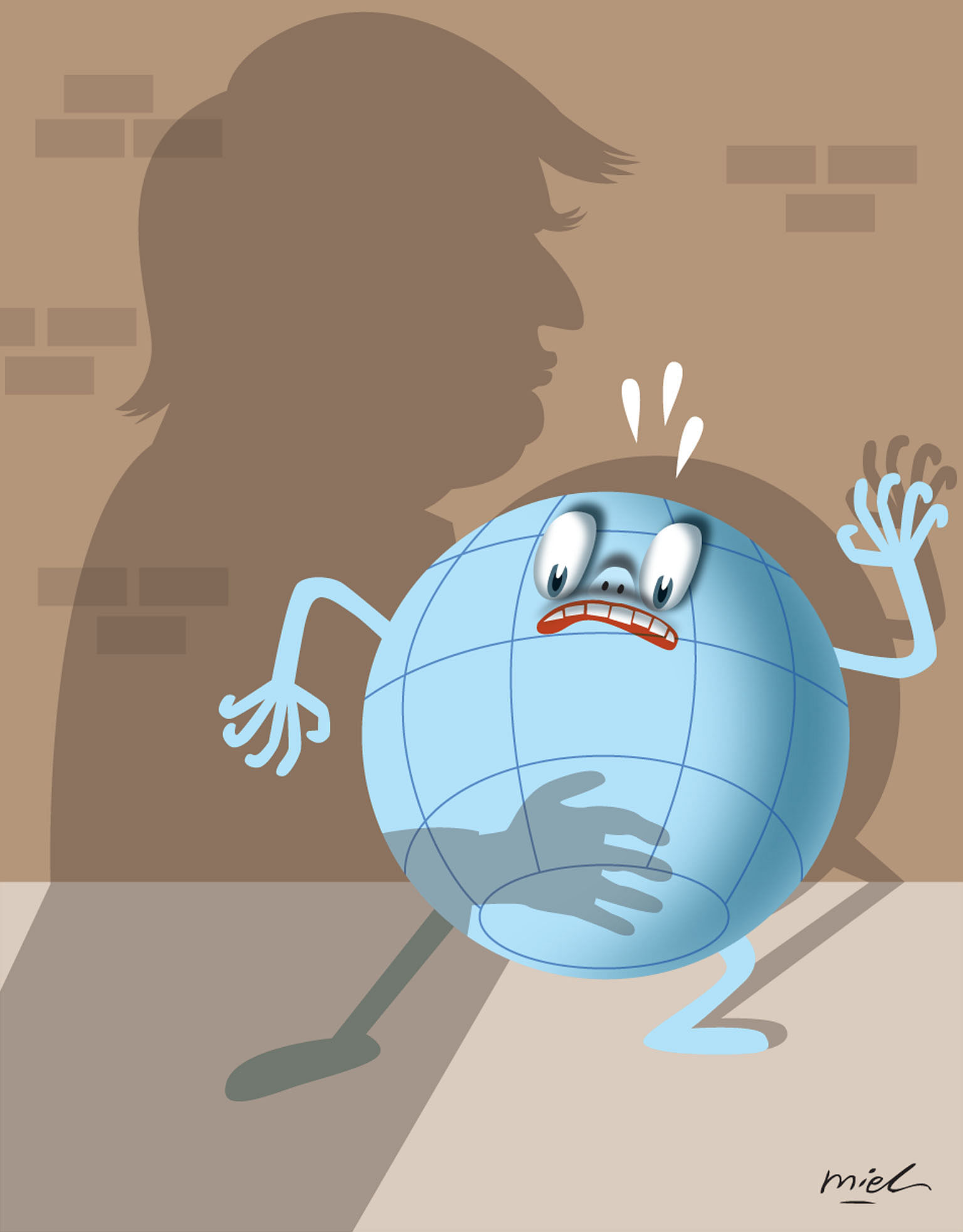Is it time to stop worrying about America's global role under Mr Donald Trump? Maybe it is.
In the weeks since his inauguration, the new US administration has taken several steps to reassure a nervous world that it will not abandon longstanding allies and overturn the foundations of key relationships.
Some commentators and even some governments have eagerly concluded that Mr Trump's America can, after all, be relied upon to keep US foreign policy on an even keel and sustain the global order which has, for so long, relied on the deft and principled exercise of American power. Are they right? Can we trust the Trump administration to conduct a coherent and responsible foreign policy?
The evidence that we can is quite substantial. In Europe over the past few weeks, senior administration officials, including Vice-President Mike Pence, Secretary of State Rex Tillerson and Defence Secretary James Mattis, have unambiguously reaffirmed America's commitment to Nato and their willingness to stand up to President Vladimir Putin of Russia. In Mexico last week, Mr Tillerson and new Homeland Secretary John Kelly reassured their hosts about Mr Trump's crackdown on illegal immigration.
In Asia, General Mattis has made his first trip in his new job to Japan and South Korea, during which he explicitly reassured a nervous Tokyo of US support, including over the contested Senkaku/Diaoyu Islands. This message was reinforced when the new President himself hosted Japanese PM Shinzo Abe for what seemed like a successful visit, which included a stay at a Trump resort in Florida.
Perhaps most importantly, the new President has conducted a successful phone call with his Chinese counterpart, during which Mr Trump reportedly abandoned his earlier threat to reconsider America's One-China policy, and thus removed a very serious danger to the future of the world's most important bilateral relationship.
And the administration seemed to step back from Mr Tillerson's ill-considered threat in his Senate confirmation hearings last month to block Chinese access to its island bases in the South China Sea, which raised real fears about the risk of a military clash.
If these were normal times in Washington, and Mr Trump was a normal president, we might well be justified in interpreting all this as business as usual. Even the untidy resignation of General Michael Flynn as Mr Trump's first national security adviser might be seen to fit this pattern. Any new administration takes a little time to settle into office, abandon the extreme positions that are an inevitable part of electioneering, stop thinking like a political campaign and start acting like the government of the world's most powerful state.
So is this what we are seeing here? Is the most "unpresidential" candidate in US political history now starting to think and act like a president? Are his advisers starting to function as a cohesive, disciplined team capable of making and implementing good policy decisions - and decisions that will sustain, rather than undermine, the US contribution to peace and prosperity? Alas, too much of the evidence points the other way. There are three big sets of reasons not to stop worrying.
SELF-CONTRADICTING
First, there is the new administration's way of doing business and, indeed, its approach to its task.
There seems little doubt that the most influential figures around the President today are people like Mr Steve Bannon, whose whole aim seems to be to prevent the White House settling down into a routine of stable, predictable and effective government. He seeks instead to make the Trump presidency an era of perpetual revolution.
This means that the more sensible advisers are already looking sidelined and ineffectual. The starkest example is former ExxonMobil chief Tillerson who, despite his South China Sea comments, seems to add steadiness, experience and judgment to the team around Mr Trump. But since the inauguration, he has been almost invisible, taking little part in major meetings such as with Mr Abe. His pick for his own deputy was rejected by the White House, and his department has been muzzled. The State Department's daily press briefings, a fixture of world diplomacy since the 1950s, have not been held for weeks.
Worst of all, Mr Trump himself routinely undermines the authority of his more responsible advisers and the credibility of US policy by freely, and even gleefully, contradicting them - and often himself, as well. Just last week, he insisted that America's deportation of illegal immigrants to Mexico would be a military operation, just as General Kelly was in Mexico saying categorically that it would not be.
There is no reason to think these are just teething troubles. They reflect the kind of person Mr Trump is, the kind of people he likes to have around him and the kind of administration he intends to run.
A QUESTION OF SUBSTANCE
Second, there are real problems of substance, as well as style and process. Look, for example, at the question of America's key alliances in Europe and Asia. What real value can we put on the reassurances offered to Nato and Japan over the past few weeks? The problem is not just that Mr Trump is more than likely to turn around and say the opposite at any moment.
The much deeper question is whether, whatever he or his advisers say, can America really be counted on to back up its allies in a crisis if that means risking an escalating war with a major nuclear power like China or Russia? That depends not on the much-discussed question of whether allies spend enough on their own defence.
It depends on whether Mr Trump's America really believes that US interests are so deeply engaged in Asia and Europe today as to warrant such a risk. So sustaining these alliances requires much more than a few nice speeches. It requires a major strategic argument backed by real and substantive commitments.
The new administration needs to show how and why it would be willing to confront major rivals when it is really necessary, as well as reassure us that it will avoid pointless confrontations with them over trivial questions when it is not. Nothing we have heard from Washington since the inauguration provides that kind of reassurance.
ORDER IN AMERICA
And thirdly, there is the question of what the Trump presidency might mean for America itself.
Serious people in Washington, like ex-president George W. Bush's former speechwriter David Frum, worry that his style of government and politics might come to threaten America's constitutional order. We'd be unwise to dismiss that as entirely fanciful, and we'd be unwise to underestimate what that would mean for the rest of the world if it happened.
So we'd be unwise to stop worrying about Mr Trump.
The writer is a professor of strategic studies at the Australian National University in Canberra.



